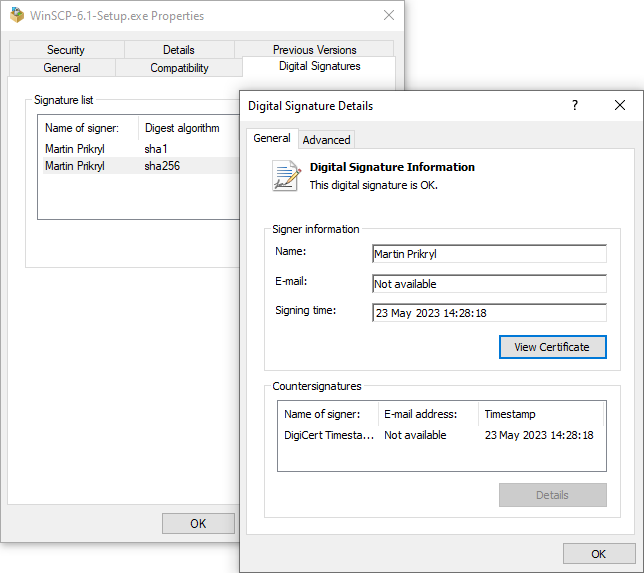This is an old revision of the document!
Installation
This article contains detailed description of downloading and installing WinSCP. You may want to see simplified guide to the process instead.
The most users will prefer installing WinSCP for an easy setuExternal Linkp.
= an use WinSCP executable as a Though note that, if you prefer so, you cportable application with its [[config|settings = stored in an INI file]] and no installation required. This configuration is best for using WinSCP from a removable media.
- Obtaining WinSCP
- Running the WinSCP Installation Program
- Upgrading WinSCP
- Downgrading WinSCP
- Removing / Uninstalling WinSCP
- Automating Installation and Uninstallation
- Custom Distribution of WinSCP
- Administration Tasks
- Verifying Integrity of Installer
Obtaining WinSCP
You can obtain WinSCP from the WinSCP download page. You should save the installer to an easily accessible location such as your Microsoft Windows desktop or your My Documents folder.
WinSCP is also available from Microsoft Store.
Running the WinSCP Installation Program
- If you have WinSCP running, close it. The installer will not run if it finds any instance of WinSCP running.
- Open the installation program by double clicking on its icon.
- The WinSCP installer starts. Follow its instructions.
Upgrading WinSCP
To upgrade WinSCP, download the newer version, and then install it. The installation will preserve your configuration, and – if necessary – upgrade it.
The new WinSCP version will be installed in your language, unless this particular localization is abandoned for a long time. The installation package contains all the translations that are actively maintained at the time of its release. Otherwise you must install the new translation manually, if available. Any translation from your previous WinSCP version will not work with the new version.
When upgrading Portable executable, just replace the executable files with the new version. New version can always read configuration from the old version.
You can check for rare backward incompatible changes.
Downgrading WinSCP
In most cases, you may downgrade in the same way as upgrade (i.e. install the old version over the newer one). However safe way is to uninstall the newer version (while keeping your configuration) and only then install the old version.
Note that some of your configurations may be lost when downgrading. To make sure that you will be able to downgrade, you should backup your configuration before the upgrade.
Removing / Uninstalling WinSCP
To remove WinSCP, go to Control Panel > Programs > Uninstall a program.
On Windows 10, you can also use Settings > System > Apps & features.
During the removal, WinSCP will ask if you want to remove WinSCP configuration and other data stored on your computer.
Automating Installation and Uninstallation
WinSCP uses Inno Setup as installer. It lets you use optional command-line parameters to automate the installation.
You can use following parameters to automate the installation:
/LANG=language– Runs the installer using the specified language. For thelanguage, use the Code from translations page./SILENT– Runs the installer without any prompts (with the exception of error messages, etc.). Default selections are used for destination folder, components, etc./VERYSILENT– As/SILENT, but without showing the progress window./NORESTART– Instructs installer not to reboot even if it’s necessary./LOG="filename"– Causes Setup to create a log file./LOADINF="filename"– Instructs Setup to load the settings from the specified file after having checked the command line. This file can be prepared using the/SAVEINFparameter./SAVEINF="filename"– Instructs Setup to save installation settings to the specified file./NOCLOSEAPPLICATIONS– Prevents Setup from closing applications using files that need to be updated by Setup.
See full list of Inno Setup setup command line parameters.
WinSCP uninstaller (unins000.exe in WinSCP installation directory) has the same parameters as above (except for /LOADINF and /SAVEINF).
See full list of Inno Setup uninstaller command line parameters. When running uninstaller silently, configuration and other data stored on your computer are not removed.
Custom Distribution of WinSCP
Learn how to create a custom distribution of WinSCP.
Administration Tasks
Learn how a system administrator can restrict or enforce certain functionality of the application.
Verifying Integrity of Installer
Optionally, as a security measure, you can verify an integrity of the WinSCP installer binary before installing.
In Windows File Explorer display Properties of the installer and verify a signature on the Digital Signatures tab. The installer should be signed by “Martin Prikryl”.
- The EV certificate used to sign the latest installers is valid from 2020-02-10 to 2023-02-17 and has the following SHA-1 thumbprint (hash):
fb845245cfbb0ee97e76c775348caa31d74bec4c - The certificate that was used to sign older installers was valid from 2016-11-17 to 2020-01-23 and has the following SHA-1 thumbprint (hash):
0b3d1c21773b6fd78fbf418a5ea2d91c0e5144d3
The certificate can also be displayed on the User Account Control prompt, when starting an installation for all users.
You can also verify file integrity manually. Find checksums of the installer binary in the release notes or on the installer download page. You can cross-check the checksum against a copy of the release notes on the SourceForge server. Use the certutil tool to calculate a SHA-256 checksum of the downloaded installer and compare it.
C:\...>certutil -hashfile WinSCP-6.5.5-Setup.exe SHA256 SHA256 hash of WinSCP-6.5.5-Setup.exe: 8c223402d933df4430f2c6e3cad17ed1db17710abfd13d62acc707ea480a092f CertUtil: -hashfile command completed successfully.

